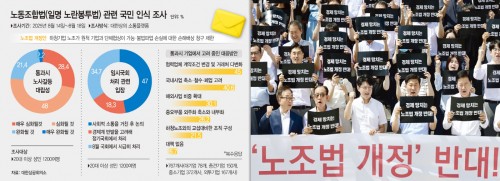 |
| Leaders of six major business associations and regional employer groups chant slogans during a rally opposing revisions to the Trade Union Act in front of the National Assembly in Seoul on August 19. / Source: Lee Byung-hwa |
As the National Assembly pushed ahead with the so-called “Yellow Envelope Law” — amendments to the Trade Union and Labor Relations Adjustment Act — backlash from the business community reached a peak on August 19, with surveys showing ordinary citizens also fear worsening labor disputes.
At a rally on the steps of the National Assembly, six major business associations, including the Korea Employers Federation (KEF), Korea Chamber of Commerce and Industry, Korea International Trade Association, Korea Federation of SMEs, and Korea Federation of Mid-sized Enterprises, denounced the legislation, joined by regional and sectoral groups. They warned that the bill threatens corporate stability by limiting damage claims against illegal strikes and extending subcontractor unions’ bargaining rights directly to parent companies.
“The amendment legitimizes strikes by subcontractor unions against prime contractors and even makes business management decisions the subject of labor disputes, placing the economy at risk,” the KEF declared.
Executives cautioned that an expanded definition of “employer” would destabilize industrial ecosystems built on extensive subcontracting, especially in export-heavy sectors like autos and shipbuilding, where supply chains involve hundreds of firms. In construction, they added, strikes could trigger apartment and infrastructure project delays.
According to a Korea Chamber of Commerce and Industry (KCCI) survey of domestic and foreign-invested companies, 45 percent said they would alter contract terms or diversify suppliers if the law passes, while 40.6 percent would consider scaling back or exiting Korean operations altogether.
Public sentiment also reflected unease. In a KCCI poll of 1,200 respondents, 28.4 percent said labor disputes would “greatly intensify” and 48 percent expected they would “somewhat intensify.” Only 8.2 percent supported the legislation, while 35.6 percent feared it would slow restructuring and tech investment, and 58 percent stressed labor-management dialogue should come first.
Business groups stressed that Korea already suffers more workdays lost to strikes than many advanced economies. “If management decisions themselves become the target of disputes, Korean companies will not be able to compete normally in global markets,” one statement read.
They criticized lawmakers for pressing ahead with the bill “without sufficient social dialogue or labor-management consultation,” warning that it could trigger broad disruption across the industrial landscape.
Most Read
-
1
-
2
-
3
-
4
-
5
-
6
-
7





















